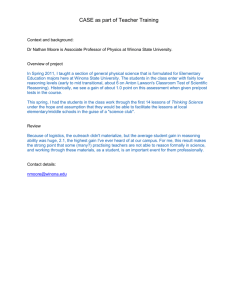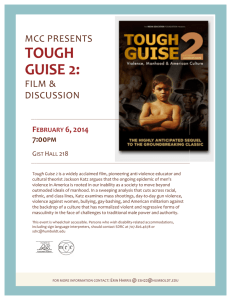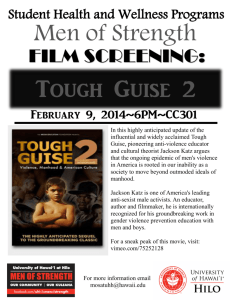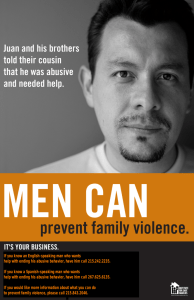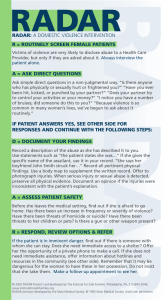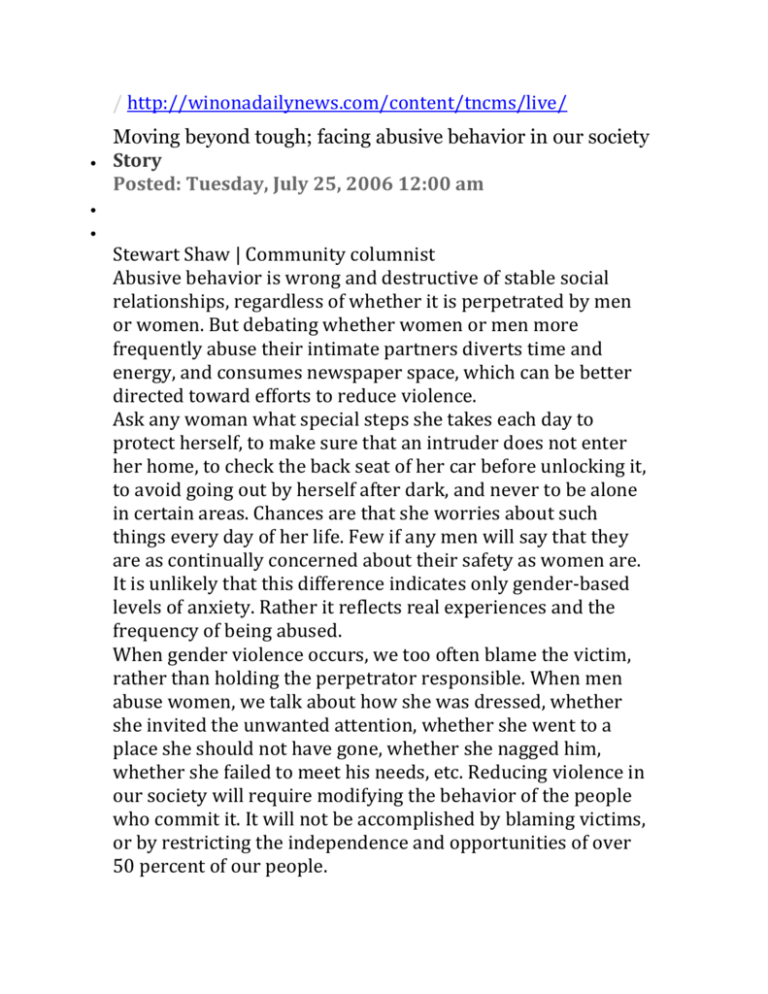
/ http://winonadailynews.com/content/tncms/live/
Moving beyond tough; facing abusive behavior in our society
Story
Posted: Tuesday, July 25, 2006 12:00 am
Stewart Shaw | Community columnist
Abusive behavior is wrong and destructive of stable social
relationships, regardless of whether it is perpetrated by men
or women. But debating whether women or men more
frequently abuse their intimate partners diverts time and
energy, and consumes newspaper space, which can be better
directed toward efforts to reduce violence.
Ask any woman what special steps she takes each day to
protect herself, to make sure that an intruder does not enter
her home, to check the back seat of her car before unlocking it,
to avoid going out by herself after dark, and never to be alone
in certain areas. Chances are that she worries about such
things every day of her life. Few if any men will say that they
are as continually concerned about their safety as women are.
It is unlikely that this difference indicates only gender-based
levels of anxiety. Rather it reflects real experiences and the
frequency of being abused.
When gender violence occurs, we too often blame the victim,
rather than holding the perpetrator responsible. When men
abuse women, we talk about how she was dressed, whether
she invited the unwanted attention, whether she went to a
place she should not have gone, whether she nagged him,
whether she failed to meet his needs, etc. Reducing violence in
our society will require modifying the behavior of the people
who commit it. It will not be accomplished by blaming victims,
or by restricting the independence and opportunities of over
50 percent of our people.
A couple of years ago a group of Winonans who deplore
abusive behavior asked representatives of several local
organizations whether they would be supportive of an effort to
reduce violence in our community caused by men.
Representatives of Central and Faith Lutheran churches, the
Unitarian/Universalist Fellowship, St. Mary's Catholic Church,
the Women's Resource Center, and classes at Winona State
University and Riverway charter school encouraged the group
to undertake what has become the Beyond Tough Guise
initiative.
Just as the prevalence of smoking in almost all public places
was not significantly reduced until our communal norms
concerning where smoking is acceptable changed, so the
prevalence of abuse committed by men will not be
substantially lessened until we adopt a different standard of
acceptable male behavior. Televised wrestling, popular music
that encourages violence, locker room humor, adult book
stores, movies in which violence prevails, video games, and
other cultural influences have contributed to acceptance of
male behavior that exhibits belligerence, bullying, selfishness,
in-your-face conduct, gratuitous violence and other negative
characteristics, destructive of normal human development and
functional social relationships.
In the interests of promoting a new model of what it means to
be a man - one beneficial both to men and to women they
relate to - Beyond Tough Guise participants have identified key
characteristics of desirable behavior. They are respect for
women, girls, other men and other boys; honesty in all
dealings; resolving conflicts through negotiation and nonviolence; responsibility for yourself; being an engaged listener;
responsibility to family, friends and community; using power
appropriately; practicing collaborative leadership; expressing
feelings and appreciating affection; and encouraging,
maintaining and valuing relationships.
The purpose of the Beyond Tough Guise initiative is to
encourage members of the community to live these
characteristics, and institutions to support this positive vision
of masculinity. A reduction of violence and the creation of an
atmosphere in our community that supports spiritual growth
for all of us will result.
All of these characteristics are desirable for women as well as
for men. The local Beyond Tough Guise initiative developed
them to influence male behavior, primarily, because the other,
contrary model of male behavior is so prevalent in our
community and society.
The appropriate use of power is one of the most important of
these characteristics. Abusive male behavior often results from
efforts to control women. Abusive men may refuse to accept
"no," and expect a woman to do anything they command her to
do. Preventing her from being employed, denying her
opportunities to associate with persons of her choice,
depriving her of sleep and insisting on physical intimacy
whenever he wants, regardless of what she wants, are
practices of an abusive man influenced by a dysfunctional
model of male behavior.
Even Christian teaching is sometimes distorted to support this
malevolent view of acceptable male behavior.
St. Paul's prayer, that all of us reflect the love with which God
loved him, is replaced by the mistaken claim that a man can do
whatever he wants to his wife because she is obligated to obey
him.
Although Paul thought wives are "subject to" their husbands,
what is often forgotten is that he also said husbands are subject
to their wives, and should show consideration for their wives,
honoring and respecting them, never treating them harshly,
because in Christ there is no male and female. We are all one.
Anyone interested in further pursuing an answer to the
question of whether men or women are more abusive may go
to the Web site of the national Centers for Disease Control www.cdc.gov. Click on Injury and Violence on the left side of
the page.
Stewart Shaw is a former Winona State University registrar who
is getting a second education in retirement. He also volunteers
for several local organizations.
A middle-age man kills his wife in the course of an argument.
To police he explains that he "lost it." A young man fatally
shoots his girlfriend and then takes his own life, a few months
after the couple's infant daughter died.
Shocking events. And they happened not in some distant urban
ghetto, or backwoods hollow, but right here, in the Hiawatha
Valley. Front-page stories with big headlines in our local
newspapers, but they report only the tip of the iceberg of
abuse, usually perpetrated by males, going on all around us.
Nationally, almost one-third of American women said they had
been physically or sexually abused by a husband or boyfriend,
according to a study published in the Journal of the American
Medical Association in 2001. Twenty percent of adolescent
girls said they were physically or sexually abused by a date.
Between 20 percent and 25 percent of college women have
experienced attempted or completed rape during their student
years.
Nearly 18 million American women had been raped or are the
victims of attempted rape.
I can think of no good reason to assume that abuse is any less
common in Winona than in the rest of our nation.
Translating these percentages to the 14,000 or so female
residents of the city of Winona, and about 7,000 coeds
attending colleges here, the following numbers come up: More
than 4,000 Winona women have been abused by a husband or
boyfriend who "lost it." Somewhere between 300 and 400 local
adolescent girls have been physically or sexually abused by a
date. Close to 1,500 women who attend colleges or universities
in Winona are rape victims.
And somewhere between 1,500 and 2,000 female Winona
residents have been raped or are victims of attempted rape.
Against the background of this local and national disgrace,
psychologists, therapists, counselors and concerned citizens
work to help victims and repentant abusers regain their
humanity and change their ways so that they respect the rights
and wishes of the women in their lives. One of them, Jackson
Katz, has just published a new book, called "The Macho
Paradox." Katz outlines a blueprint for reducing maleperpetrated abuse:
Recognize that abuse is a male problem, not a female
problem. Generally, women don't attack their partners -men
do. Female-perpetrated violence against other people
constitutes a tiny fraction of the total. And men and boys
physically, mentally, verbally and sexually assault other men
and boys, as well as women.
Convince abusers that it is in their best interests to change
their behavior; otherwise, they will not acknowledge their
abusiveness and eliminate it.
Encourage other men to let perpetrators know that violence
against women, controlling their lives, and acting in ways
that diminish their independence and lower their selfesteem is culturally unacceptable.
In other words, men have to tell men that abusive behavior is
not acceptable; women doing that won't be effective.
Virtually every male has a mother, wife, daughter, sister or
friend about whom he cares very deeply. What will it take to
persuade them to recognize that a significant overall reduction
in male-perpetrated violence will lessen the risk that a female
important to them will be assaulted or sexually abused? What
emotional damage is done to the children of abusive men as
they helplessly watch their mothers and sisters being
assaulted?
In Winona, an initiative of community volunteers - men and
women - seeks answers to these questions. Called The Beyond
Tough Guise (BTG) initiative, after the title of an awardwinning movie starring Katz, this group seeks to change
acceptable norms of male behavior in our community.
With a grant from the Winona Community Foundation and the
Women's Resource Center acting as fiscal agent, BTG sponsors
a Youth Action Theatre project on demonstrating ways of
changing abusive behavior. High school students act out typical
incidents that occur in their lives and interventions that
eliminate violence. Recently they engaged Winona Middle
School eighth-graders in active participation and thinking
about strategies of intervention that would prevent or stop
abuse. Some of the eighth-graders suggested that these
presentations be given to students as young as elementary
level.
Participants in the Beyond Tough Guise initiative work to stop
violence and abuse in our work places, businesses, the media,
our churches and other organizations, as well as our schools.
An organization called Minnesota Men's Action Network aims
to develop a 500-man statewide association of men working to
prevent sexual and domestic violence.
Your help is needed and wanted. For more information, email BTG@hbci.com, or call Randy Schenkat at (507) 4527168, or Joe Morse at (507) 452-8232.
Stewart Shaw is a former Winona State University registrar
who is getting a second education in retirement. He also
volunteers for several local organizations.
Copyright 2011 winonadailynews.com. All rights reserved.
This material may not be published, broadcast, rewritten or
redistributed.
Posted in Opinion on Sunday, July 2, 2006 12:00 am Updated:
1:27 pm.


